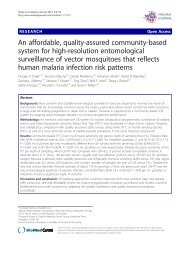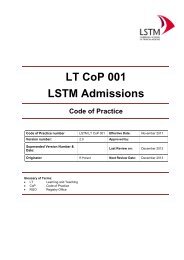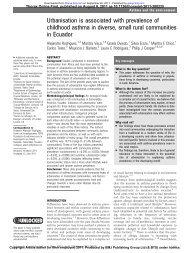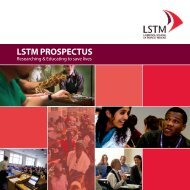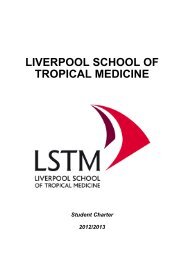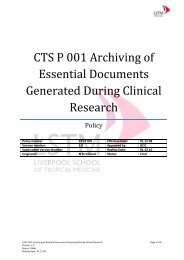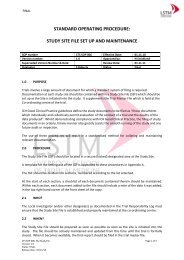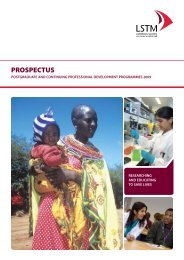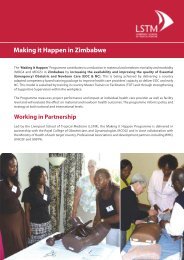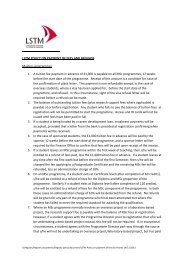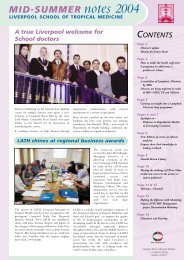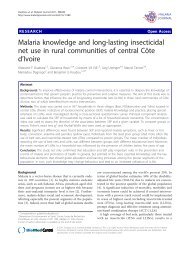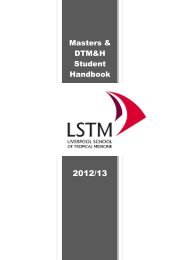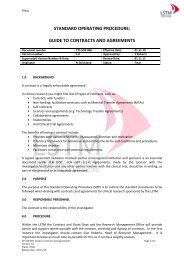Annual Report 2008 - 2009 - Liverpool School of Tropical Medicine
Annual Report 2008 - 2009 - Liverpool School of Tropical Medicine
Annual Report 2008 - 2009 - Liverpool School of Tropical Medicine
You also want an ePaper? Increase the reach of your titles
YUMPU automatically turns print PDFs into web optimized ePapers that Google loves.
BREAKTHROUGH SHOWS GENETIC BASIS<br />
FOR RESISTANCE TO INSECTICIDES<br />
Research led by the Vector Group at<br />
LSTM has identified the genetic basis for<br />
resistance to commonly-used insecticides<br />
in one <strong>of</strong> the major malaria-carrying<br />
mosquitoes in Africa.<br />
Malaria remains one <strong>of</strong> the biggest killers<br />
<strong>of</strong> children and pregnant women in the<br />
developing world and much <strong>of</strong> the effort<br />
to combat malaria is focused on controlling<br />
mosquitoes through the use <strong>of</strong> insecticides<br />
in bednets and indoor residual spraying.<br />
Mosquitoes can evolve to overcome the<br />
way in which insecticides work and the<br />
emergence <strong>of</strong> insecticide-resistant strains<br />
<strong>of</strong> mosquitoes is an increasing problem,<br />
therefore understanding more about its<br />
genetic and biological basis is critically<br />
important.<br />
The team, led by Dr Charles Wondji, studied<br />
strains <strong>of</strong> the Anopheles funestus mosquito<br />
and identified a family <strong>of</strong> genes coding<br />
for enzymes known as cytochrome P450s,<br />
detecting two genes which were associated<br />
with resistance to pyrethroid insecticide.<br />
Dr Hilary Ranson, also <strong>of</strong> the Vector Group<br />
and an author <strong>of</strong> the study, explained<br />
that these same genes were also recently<br />
identified with pyrethroid resistance in the<br />
other major malaria-carrying mosquito<br />
in Africa, Anopheles gambiae: “We<br />
expected to find that different species and<br />
populations would have different groups <strong>of</strong><br />
genes responsible but they are very similar.<br />
This is encouraging news because it means<br />
that work to overcome resistance in one<br />
species is likely to be effective against the<br />
other.”<br />
Furthermore, provided these genetic<br />
markers identified in laboratory populations<br />
<strong>of</strong> mosquitoes are equally predictive in<br />
the field – something currently being<br />
tested by Dr Wondji – this will overcome a<br />
major blocking point in the evaluation <strong>of</strong><br />
wild mosquito populations. Routine use<br />
<strong>of</strong> these molecular markers for resistance<br />
will provide early warning <strong>of</strong> future control<br />
problems due to insecticide resistance<br />
and should greatly enhance the ability to<br />
mitigate the potentially devastating effects<br />
<strong>of</strong> resistance on malaria control.<br />
250 million<br />
THE NUMBER OF MALARIA CASES<br />
THAT EMERGE EACH YEAR<br />
PROFESSOR MIKE LEHANE BSc PhD<br />
HEAD OF THE VECTOR GROUP<br />
PROFESSOR OF MOLECULAR ENTOMOLOGY AND PARASITOLOGY<br />
The laboratory based studies <strong>of</strong> Mike’s research group are centred primarily on investigations<br />
<strong>of</strong> vector parasite interactions with a large scale gene discovery programme. This work is<br />
done in collaboration with the University <strong>of</strong> Yale, US and the University <strong>of</strong> Victoria,<br />
Canada. Mike’s team are also undertaking studies on sandfly interactions.<br />
LSTM ANNUAL REPORT 29



